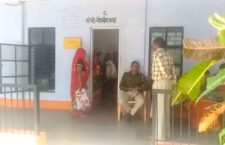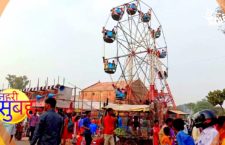Two Girls, Diksha Yadav, a young girl, all of 8 years of age, dons a turban and suit over her frock, and also a red teeka on her forehead, as she excitedly sings a song on the lines of courage, valor, and history. The song mentions erstwhile kings and queens, such as the Rani of Jhansi, who have died in battle.
This isn’t just a child’s rendition of popular history, but a rendition of ancient folk art, by perhaps the youngest Alha-Khand singer in Bundelkhand today. Two Girls Diksha and Prateeksha Yadav, 8 and 11 years of age, have earned a name for themselves, by being the only female artists of the Bundeli version of Alha Khand.
Dating back to the 12th-century C.E, Alha Khand is a collection of poetic works or ballads that are an ode to the bravery of two 12th century Rajput heroes, Alha and Udal, who were generals in the court of the king Paramardi-Deva (Parmal) of Mahoba in Bundelkhand. Just before the Turkish conquest of India in this century, the three main Rajput kingdoms of North India were Delhi, Kannauj, and Mahoba.
In the battle between the three kingdoms, the two brothers are said to have fought fiercely against the army of Prithviraj Chauhan, the ruler of Delhi. Despite the loss of the Mahoba kingdom in the battle, the valor of the generals is still celebrated to this day and age, in keeping with a reminiscence for the Chandela history of Bundelkhand. There are many versions of this work, in the various dialects of Bundelkhand including, Bundeli, Bagheli, the Awadhi, Bhojpuri, Maithili, and Kannauji. It has also undergone several changes and additions over the years, to include more contemporary events in history.
This isn’t just a child’s rendition of popular history, but a rendition of ancient folk art, by perhaps the youngest Alha-Khand singer in Bundelkhand today. Diksha and her sister Prateeksha Yadav, 8 and 11 years of age, have earned a name for themselves, by being the only female artists of the Bundeli version of Alha Khand.
Dating back to the 12th-century C.E, Alha Khand is a collection of poetic works or ballads that are an ode to the bravery of two 12th century Rajput heroes, Alha and Udal, who were generals in the court of the king Paramardi-Deva (Parmal) of Mahoba in Bundelkhand. Just before the Turkish conquest of India in this century, the three main Rajput kingdoms of North India were Delhi, Kannauj, and Mahoba.
In the battle between the three kingdoms, the two brothers are said to have fought fiercely against the army of Prithviraj Chauhan, the ruler of Delhi. Despite the loss of the Mahoba kingdom in the battle, the valor of the generals is still celebrated to this day and age, in keeping with a reminiscence for the Chandela history of Bundelkhand.
There are many versions of this work, in the various dialects of Bundelkhand including, Bundeli, Bagheli, the Awadhi, Bhojpuri, Maithili, and Kannauji. It has also undergone several changes and additions over the years, to include more contemporary events in history.
Generally sung exclusively by men, Prateeksha and her sister are breaking tradition by being one of the very few female practitioners of the art form. Prateeksha, who is as expressive in her regular chatter, as she is while performing, spoke to us about how she’s seen many performances of Alha-Khand, as a child growing up in Mahoba, the center of its inception. “I got so fascinated by the art form, that I asked my father to teach my sister and me,” she says.
Ram Singh Yadav, the children’s father, is someone who has nurtured an amateur interest in the art form.
He spoke to us about seeing his kids as performers today, “ I just started teaching them a few of the songs due to their fascination with it, but today they have gone much further ahead than me. Initially, people used to ask why I am teaching my daughters this art, as opposed to something like Bhajans that are more suited for girls. My efforts have paid back since Prateeksha is the first female performer of the Bundeli version of Alha Khand”.
Two Girls ,Prateeksha and Deeksha, have already many years of performances behind them, at various platforms in the state, and beyond, and they hope to take it further ahead. This Children’s Day, we celebrate young girls like them who are breaking regressive norms and traditions while also keeping ancient history and culture alive solely by their passion.

